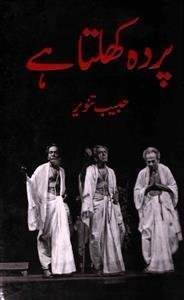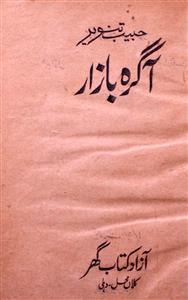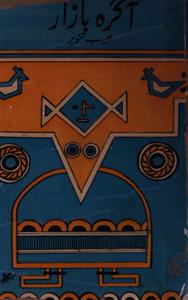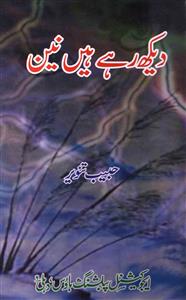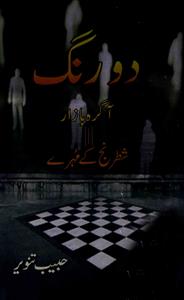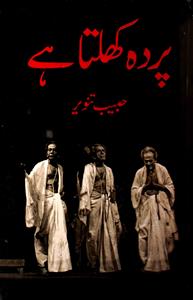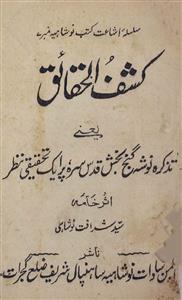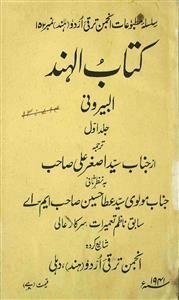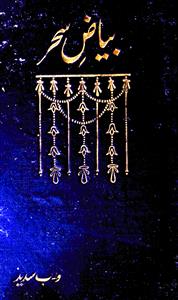 For any query/comment related to this ebook, please contact us at haidar.ali@rekhta.org
For any query/comment related to this ebook, please contact us at haidar.ali@rekhta.org
About The Book
اردو ہندی کے ڈراما نگار اور ٹھیٹر ڈائریکٹر حبیب تنویر جو کہ اس آپ بیتی کے مصنف ہیں، انہوں نے اپنے کیریئر کا آغاز صحافت سے کیا، موسیقی اور شاعری سے بھی شغف رہا ، راجیہ سبھا کے رکن رہ چکے ہیں اور ملک کے اعلیٰ اعزازات سے بھی نوازے گئے ۔ ان کی زندگی میں بے شمار نشیب و فراز ہیں اور جیسا کہ وہ خود لکھتے ہیں کہ انسان نیکی و بدی کا مجموعہ ہے ۔ اس صورت میں اگر کوئی خود نوشت لکھی جائے اور اس میں ایسے واقعات کا انتخاب کرنا پڑے جن کا مصنف کی ذات پر گہرا اثر پڑتا ہو،بہت دشوار ہوتا ہے مگر ایمانداری یہی ہے کہ انہیں لکھ دیا جائے ۔ مصنف تصنیف کی فرضیت سے واقف ہیں اسی لئے انہوں نے بلا کسی ہچکچاہٹ کے سب کچھ اپنی اس آپ بیتی میں لکھ دیا ہے۔ حالانکہ اس حق گوئی کی وجہ سے کئی دوسرے اشخاص بھی صدمے کی زد میں آئے ،مگر انہوں نے آپ بیتی کے معیار کو نہ گرنے دینے کی ٹھان لی ۔ ان کے اسی عزم صیمیم کا نتیجہ ہے کہ ایک بہترین آب بیتی ہمارے سامنے ہے جس میں نئے اسلوب ، نئے انداز اور نئی لذت کا طرز تحریر موجود ہے ۔ اس کتاب سے نئی نسل کو رہنمائی ملنا یقینی ہے ۔ اندرون صفحہ مصنف کی تصویردیکھ کر ماضی کی یاد تازہ ہوجاتی ہے۔
About The Author
Indian playwright, actor, and director Habib who broke with European form to embrace Indian folk cultures. Tanvir grew up in Raipur and moved to Bombay (now Mumbai) in 1945 to join the egalitarian groups - the Indian People’s Theatre Association and the
Progressive Writers Association. Tanvir’s first success was Agra Bazar (1954), in which he brought urban middle-class actors together with uneducated folk artists for the first time on the Indian stage. He studied theatre in England at the Royal Academy of Dramatic Arts, but it was the work of German dramatist Bertolt Brecht and the traditional actors of Tanvir’s homeland who most influenced him. In 1959 Tanvir and his future wife, Moneeka Mishra, founded Naya Theatre, a company devoted to folk performance. To allow his uneducated actors to work naturally, Tanvir used the Chhattisgarhi dialect rather than formal Hindi in his plays and worked from improvisations rather than formal scripts. Tanvir drew from both Brecht and indigenous theatre and was also known for his incorporation of folk songs, poems, and music into his plays, exemplified in his much-admired Charandas Chor(1974). He also acted in several movies, notably Gandhi (1982), and was a member (1972–78) of India’s Parliament.
 For any query/comment related to this ebook, please contact us at haidar.ali@rekhta.org
For any query/comment related to this ebook, please contact us at haidar.ali@rekhta.org
